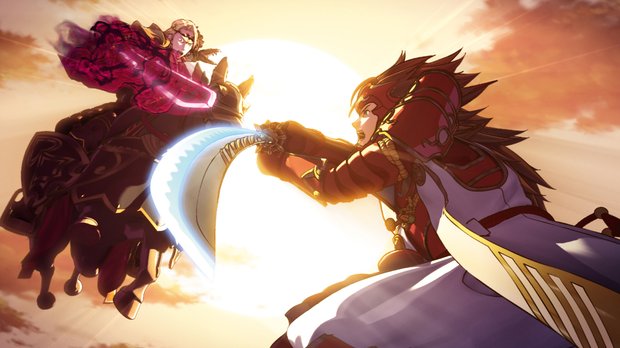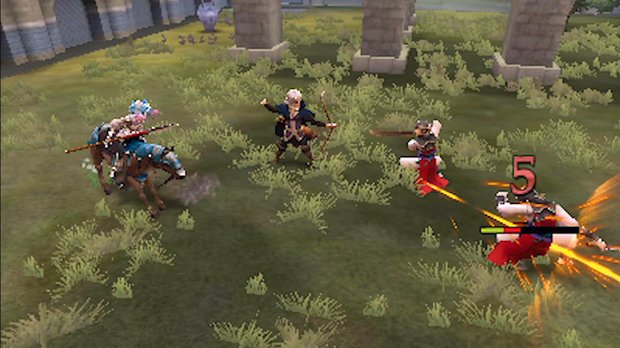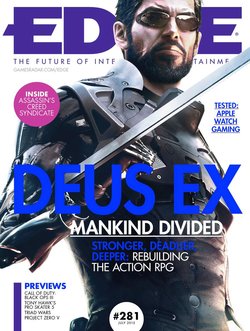War is full of love in Fire Emblem If
Love is a complex force, capable of binding opposed minds together, but also tearing lives apart. Evidently, Intelligent Systems realises that ‘It’s complicated’ is more than a trite Facebook status, because its newest Fire Emblem game (subtitled If in Japan) is as much about warring hearts as clashing blades. Where 2012’s Fire Emblem: Awakening focused on bringing your party together, forging bonds between characters on the bloodied fields of turn-based battle that had ramifications far beyond helpful boosts in combat, If’s three strands revolve around the tangled emotions involved in taking a Falchion to family ties.

You are the focal point for all this familial angst, torn between the people who raised you in Nohr and the ones who gave you birth in Hoshido, two kingdoms of tinder a spark away from all-out war. It’s a clear shift from Awakening, where amnesiac avatar Robin played a supporting role to prince Chrom, and now you’re responsible for shaping the path of not one civilisation, but two. Accordingly, making choices is being talked up as a major part of the game, but we know the details of only one – and it’s a decision many Japanese players will have to make in a store.
Split across two physical versions in Nintendo’s homeland, one for each kingdom, If branches off at the sixth chapter to become two different games. Side with Hoshido and you’re in for a more traditional take on series convention, with a gentler difficulty level. The Nohr campaign, meanwhile, makes you a renegade seeking to change your kingdom from within, which represents a far steeper challenge. The digital download version locks off whichever choice you eschew at first, but at least it won’t force fans to decide from the box art alone. Whichever side you don’t take at first becomes DLC, with a third, separate campaign thread due to arrive after launch.
It’s not the first time a Nintendo game has come in two variants, and the world and cast will be consistent, so perhaps it’s wise to withhold judgement until the specifics of campaign length and western pricing emerge. However, talk of character codes for favourites such as Marth, Lucina and Minerva tied to the card game launching alongside If in the east suggest that the contents of wallets is as important here as the contents of hearts.

The pricing structure is sure to be contentious, then, but what we’ve seen of If evinces many sound tweaks to the formula of 2012’s premier 3DS strategy game. For one, the split run looks to bring greater moral complexity to the plotting, while continuing the nuanced characterisations emblematic of this series. Yes, Hoshido is the noble, peaceful white to the blacker garb and vainglorious ambitions of Nohr, but there’s a greater sense of the grey areas between them, something a straight-up righteous quest to save the world from ancient evil would lack. The plot could still twist that way, of course, with glances of the hulking Nosferatu – not to be confused with the spell – and your dragon form hinting at a supernatural undercurrent, but that can’t sap the potential in exploring Nohr’s nuances.
And beyond granting characters feet – Awakening’s cast was infamously en pointe – If’s improved visuals will tie the abstract grid and 3D battle sequences together better. The camera now zooms from sprite-based tactical map to 3D locations, landmarks and even crowds of soldiers visible around heroes as they clash, affording more of a sense of controlling the key units in a war. But the greatest change is that the Dual System is no longer limited to your side, foes mimicking Awakening’s paired units, which could turn aside blows or dish out a combined attack.
Weekly digests, tales from the communities you love, and more

Just weeks away from its Japanese release, it’s understandable that feelings about If are complex. On the one hand, it bears all the hallmarks of a thoughtful, if incremental, upgrade of a template adored by many. But it’s hard to trust a game where you know more about the DLC than what you get in the box. After all, we’ve been hurt before.
Read more from Edge here. Or take advantage of our subscription offers for print and digital editions.
Edge magazine was launched in 1993 with a mission to dig deep into the inner workings of the international videogame industry, quickly building a reputation for next-level analysis, features, interviews and reviews that holds fast nearly 30 years on.



